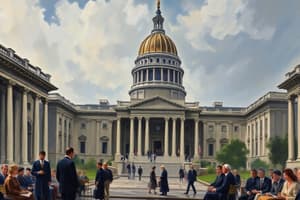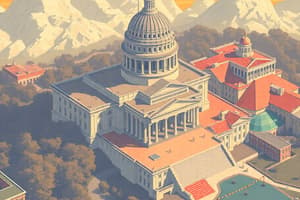Podcast
Questions and Answers
Why has Congress been referred to as "the broken branch" of government?
Why has Congress been referred to as "the broken branch" of government?
- It is successful in solving all of the nation's problems.
- It functions without any oversight from the public.
- It is often seen as a highly efficient institution.
- It is considered ineffective in addressing national issues. (correct)
What is gerrymandering?
What is gerrymandering?
- Creating new states within the union.
- A process of collecting taxes from citizens.
- Redrawing district lines to favor a political party. (correct)
- Adjusting the number of representatives based on population.
How has Congress's role changed over time?
How has Congress's role changed over time?
- The focus has shifted from law-making to representation and oversight. (correct)
- Congress is now primarily responsible for local governance.
- It has become less influential compared to the judicial branch.
- Congress now serves as the primary legislative body for all state laws.
According to the Founders' vision, what was Congress intended to be?
According to the Founders' vision, what was Congress intended to be?
Which of the following is NOT a function of the legislative branch?
Which of the following is NOT a function of the legislative branch?
What are enumerated powers?
What are enumerated powers?
What differentiates implied powers from enumerated powers?
What differentiates implied powers from enumerated powers?
Which of the following is an example of a law-making function of the legislative branch?
Which of the following is an example of a law-making function of the legislative branch?
What is the primary function of standing committees in Congress?
What is the primary function of standing committees in Congress?
Which type of committee is created specifically to resolve differences in legislative versions from the House and Senate?
Which type of committee is created specifically to resolve differences in legislative versions from the House and Senate?
What is one unique power of the House of Representatives?
What is one unique power of the House of Representatives?
Who currently leads the House of Representatives?
Who currently leads the House of Representatives?
What does the term 'whip' refer to in the context of congressional leadership?
What does the term 'whip' refer to in the context of congressional leadership?
How frequently are members of the House of Representatives elected?
How frequently are members of the House of Representatives elected?
What determines representation in the House of Representatives?
What determines representation in the House of Representatives?
Which committee is characterized as temporary and serves for a specific investigation or study?
Which committee is characterized as temporary and serves for a specific investigation or study?
Which of the following is one of the main roles of Congress?
Which of the following is one of the main roles of Congress?
What process does a bill go through in the House of Representatives?
What process does a bill go through in the House of Representatives?
What is a filibuster?
What is a filibuster?
How does Congress influence domestic affairs compared to the presidency?
How does Congress influence domestic affairs compared to the presidency?
What is the key difference between bicameral and unicameral systems?
What is the key difference between bicameral and unicameral systems?
Which power allows the president to act as the Commander-in-Chief of the armed forces?
Which power allows the president to act as the Commander-in-Chief of the armed forces?
What is political efficacy?
What is political efficacy?
Which of the following powers is considered an example of inherent powers of the president?
Which of the following powers is considered an example of inherent powers of the president?
Why does the House of Representatives have more formal rules compared to the Senate?
Why does the House of Representatives have more formal rules compared to the Senate?
What is the cumulative effect of congressional delegations of power to the president?
What is the cumulative effect of congressional delegations of power to the president?
What is the committee system within Congress?
What is the committee system within Congress?
Which of the following statements best describes executive privilege?
Which of the following statements best describes executive privilege?
Which type of power involves granting authority or responsibilities from Congress to the president?
Which type of power involves granting authority or responsibilities from Congress to the president?
Which of the following powers is most likely to spark a debate over presidential overreach?
Which of the following powers is most likely to spark a debate over presidential overreach?
Which article of the Constitution enumerates the powers of the president?
Which article of the Constitution enumerates the powers of the president?
Which informal power allows the president to influence legislation through personal connections?
Which informal power allows the president to influence legislation through personal connections?
How has the Supreme Court generally interpreted presidential power?
How has the Supreme Court generally interpreted presidential power?
What is gridlock in the context of government?
What is gridlock in the context of government?
What is the primary impact of national crises on presidential power?
What is the primary impact of national crises on presidential power?
What does 'rally around the flag' effect refer to?
What does 'rally around the flag' effect refer to?
What are the formal qualifications to become president of the United States?
What are the formal qualifications to become president of the United States?
When do presidential elections occur in the United States?
When do presidential elections occur in the United States?
What is the role of the Commission on Presidential Debates?
What is the role of the Commission on Presidential Debates?
Why was the Electoral College established by the Founders?
Why was the Electoral College established by the Founders?
Flashcards are hidden until you start studying
Study Notes
Congress
- Congress has been criticized as "the broken branch" due to public perception of inefficiency and inability to solve national problems.
- Redistricting redraws congressional districts to ensure equal representation by population.
- Gerrymandering, a controversial practice, involves redrawing districts to favor a specific party.
- Congress' role has shifted from primarily lawmaking to representation and oversight of the executive branch, reflecting the executive branch’s increased power.
- Congress was meant to be the primary branch of government, according to the Founders' vision.
- Lawmaking is conducted by the legislative branch, including the Senate, House of Representatives, and supporting agencies.
- Enumerated powers are explicitly mentioned in the Constitution, while implied powers are logically derived from them.
- The Necessary and Proper Clause (also called the Elastic Clause) is the basis for implied powers.
- Congress' four main functions are lawmaking, representation, legislative oversight, and constituency service.
- Congress dedicates more time to representation and oversight than to lawmaking.
- The lawmaking process involves multiple steps in both the House and Senate, including committees, subcommittees, floor votes, and conference committees.
- A filibuster, a tactic used in the Senate, can delay a bill with prolonged speeches. A cloture vote can end a filibuster.
- Political efficacy is the belief that individual participation in government and politics is effective.
- Congress holds more influence over domestic policy compared to the presidency.
- A unicameral legislature has one chamber, while a bicameral legislature has two chambers.
- The House of Representatives has more formal rules due to its larger size, while the Senate operates with more informal rules and traditions.
- The committee system divides labor and uses expertise to streamline legislation.
- Standing committees are permanent and focus on specific policy areas.
- Joint committees comprise members from both the House and Senate.
- Conference committees reconcile differences between House and Senate versions of bills.
- Select or special committees are temporary and address specific issues or investigations.
- The House of Representatives is currently controlled by the Republicans, with Mike Johnson as the leader.
- The Senate is controlled by the Democrats, with Chuck Schumer as the majority leader and Mitch McConnell as the minority leader.
- Whips in both chambers act as liaisons between the party leadership and members, promoting party unity.
- The House of Representatives has the power to initiate revenue bills and impeach officials.
- The Senate approves presidential appointments, treaties, and convicts impeached officials.
- Representatives are elected every two years, with 435 members representing population. Senators are elected every six years, with 100 members representing each state equally.
The Presidency
- Formal presidential powers are outlined in the Constitution (Article II), statutes passed by Congress, and case law.
- Congress has delegated significant power to the executive branch, increasing the president's influence in areas like national security and economic regulation.
- The three types of presidential powers are expressed, inherent, and delegated.
- Inherent powers are the most controversial, as they are not explicitly stated in the Constitution, leading to debates about the extent of presidential authority.
- Implied powers are not directly listed but are considered necessary to carry out the president's duties. Examples include executive orders, executive privilege, executive agreements, signing statements, and the power to fire.
- The Supreme Court has generally interpreted the Constitution broadly, allowing for expansive presidential power, particularly in foreign policy and national security, while also setting limitations.
- Presidential power is influenced by political events, circumstances, and national conditions.
- Gridlock occurs when legislative action is stalled due to divided government.
- A unified government exists when one party controls both the presidency and Congress.
- A divided government occurs when the presidency and Congress are controlled by different parties.
- The "rally around the flag" effect involves increased public support for the president during national crises, particularly in matters of foreign policy or national security.
- Formal qualifications to be president are being a natural-born citizen, at least 35 years old, and a resident of the U.S. for at least 14 years.
- Informal qualifications include political experience, communication skills, party support, and public appeal.
- Presidential elections take place every four years on the first Tuesday after the first Monday in November.
- The Commission on Presidential Debates organizes and sponsors debates between presidential and vice presidential candidates.
- The Electoral College, established by the Founders, was designed to balance power between large and small states and to provide a safeguard against direct popular vote.
Studying That Suits You
Use AI to generate personalized quizzes and flashcards to suit your learning preferences.




